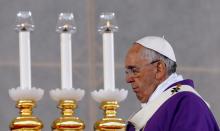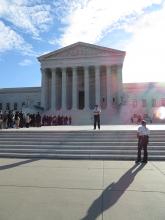Death Penalty


Like many comic book fans, I spent the weekend binging on Daredevil, Marvel’s newest release. The entire first season was created for Netflix, and it dropped in its entirety on Friday. I waited until Saturday night to dig in (longer than some friends of mine), and I was hooked from the opening scene.
It's a scene that opens with Matt Murdock (lawyer-by-day alter ego of the masked vigilante Daredevil) sitting in a confessional. He begins by telling the priest about his father, a boxer who fought harder than his record could ever show. He ends the conversation by asking not for penance, but for future forgiveness — forgiveness for what he’s about to do. “That’s not how this works,” the priest says.
Yet so much of how Murdock as Daredevil works in this latest iteration of the character is how we want it to work. Based closely on Frank Miller’s writing of the character, Daredevil proves to be someone who deals justice unflinchingly. This isn’t someone who hesitates when the situation allows for a grim, overly firm hand. Contrast this with Batman, a character who struggles to commit severe violence even when it seems to be the only option.


A new report by the Equal Justice Initiative documents in horrific detail the nation’s widespread practice of lynching and points to a link between lynching and a practice that persists today: capital punishment.
In the Jim Crow South, lynching declined as officials turned to executions as an alternative method for killing blacks in disproportionate numbers.
This report challenges us to confront our nation’s legacy of racial violence. Sadly, too many Christians were complicit in this violence, which has prompted Christian denominations to apologize and emphasize racial reconciliation. Last week, the Southern Baptist Convention held a two-day race summit in which it urged pastors to do more to diversify their churches.
These are important steps.
But they only mark time if important actions don’t follow.


The National Latino Evangelical Coalition has voted to support repeal of the death penalty, calling it an anti-life practice. Urging their 3,000 congregations to support efforts to end capital punishment across the country, NaLEC joins an increasing number of Christians across the country and internationally who are realizing afresh the moral problems with the death penalty. Most recently Pope Francis went beyond the official teaching of the Roman Catholic Church to call the “death penalty inadmissible, no matter how serious the crime committed.”
“After prayer, reflection, and dialog with anti-death penalty organizations like Equal Justice USA,” said Rev. Gabriel Salguero, president of NaLEC, in a news release. “we felt compelled to add our voice to this important issue. As Christ followers, we are called to work toward justice for all. And as Latinos, we know too well that justice is not always even-handed.”

On March 20, Pope Francis issued his most forceful call yet to abolish the death penalty, one that seemed to go even beyond current church teaching. Francis’ latest moves could signal a further development in Catholic teaching against capital punishment — and in his relationship with some U.S. Catholics.
“Today the death penalty is inadmissible, no matter how serious the crime committed,” Francis wrote in a detailed argument to the president of the International Commission against the Death Penalty, based in Madrid.
The pope said capital punishment “contradicts God’s plan for man and society” and “does not render justice to the victims, but rather fosters vengeance.”
Francis added that executing a prisoner can no longer be justified by a society’s need to defend itself. He addressed two issues prominent in the American context: He declared that the death penalty “loses all legitimacy” because of the possibility of judicial error, and he said “there is no humane way of killing another person.”
Several recent botched executions have given anti-death penalty advocates more ammunition for their arguments.
In his letter, the pontiff also repeated his view, expressed last October, that keeping inmates isolated in maximum security prisons is “a form of torture” and that life sentences are “a hidden death penalty” that should be abolished along with capital punishment.
These are unusually categorical and expansive statements, and they come on the heels of a campaign to abolish the death penalty worldwide, which gained Vatican support at a United Nations meeting in Geneva earlier this month.
In addition, four national Catholic journals from across the ideological spectrum — the National Catholic Reporter; America; Our Sunday Visitor; and the National Catholic Register — earlier this month published an unprecedented joint editorial calling for an end to the death penalty in the U.S. in the wake of those botched executions and increasing doubts about the fairness of the justice system.




An Atlanta woman’s scheduled execution was given an 11th-hour delay yet again — this time by the Department of Corrections late Monday evening.
Kelly Gissendaner, convicted in 1998 of conspiring to and abetting in murder of her then-husband, Doug, faced execution at 7 p.m. EST on Monday. Her original execution — scheduled for the evening of Feb. 25 — was delayed due to weather. After several appeals for clemency were denied by the Georgia Board of Pardons and Paroles and the Georgia Supreme Court, Gissendaner’s lawyers petitioned the Supreme Court to hear her appeal and to issue a stay in the meantime.
Though there has yet been no word from the Supreme Court, the request for delay was honored — at least in part. According to CNN, the execution is on hold due to the cloudy appearence of the drugs prepared for the execution.

Georgia clergy just delivered 500 signatures of faith leaders and 40 boxes of names from around the world — calling for a stop to tonight’s execution of Kelly Gissendaner. And there are more than 55,000 folks on the Groundswell petition that launched just yesterday, and more than 1,000 new names are coming in every hour.
But some suggest it is like speaking into thin air — that there is no chance the governor or the Georgia Board of Pardons and Parole will listen. After all, Georgia has already executed two people this year, more than any state other than Texas.
But there’s a Georgia case that would suggest otherwise, that all this may not be in vain — that of Billy Moore.
After 17 years on death row for a murder he openly confessed to doing, Billy Moore’s execution was stopped — by a groundswell of support from faith leaders (including Mother Teresa), people of conscience, and even the victim’s family. And it was the Georgia Board of Pardons and Parole that stopped his imminent execution. In fact, they eventually decided his rehabilitation was so complete and compelling that he was eligible for parole a year later.
So thousands of Georgia citizens and folks around the world are hopeful. Tonight there is an opportunity — not to be “soft on crime” or to ignore wrongdoing, but to bear witness that redemption is possible. Tonight Georgia leaders have a chance to recognize that people can be healed, rehabilitated, restored — and that they do not have to be forever held hostage and defined by the worst decision they made.

It is a great and terrible irony that our country’s correctional system does not often allow for or take much pride in perpetrators’ self-correction.
Yet to the degree that transformation within the system is possible, such appears to have happened for Kelly Gissendaner. The 46-year-old woman was sentenced to death for the 1998 murder of her then-husband, Doug. It is well-documented that her accomplice and then-boyfriend committed the act — he is sentenced to life, with a chance at parol.
Gissendaner faces excecution tonight at 7 p.m. EST.
If carried through, it will be the first time since 1976 that the state of Georgia will execute an individual who was not the person physically using violence in the crime.
Gissendaner’s case — that of a person guilty of murder whose profound internal transformation while in prison has led to a contemplative life of studying theology, mentoring at-risk youth, offering pastoral care to fellow inmates, and expressing full and sincere remorse for her actions — calls into stark question whether our criminal justice system, and specifically the state's use of the death penalty, honestly allows for the possibility for redemption.

Only 15 women have been executed in the U.S. since the reinstatement of the death penalty in 1976. For two death penalty cases involving women to make the news in the same week is unprecedented – but it’s happening.
One is Jodi Arias, convicted of killing her ex-boyfriend in 2008, whose sentencing trial was this week. She could face the death penalty in Arizona.
The other is a lesser-known case in Georgia — Kelly Gissendaner, convicted in a 1997 Atlanta murder plot that targeted her husband. Though sentenced to death, it is clear that with a little better legal coaching, Ms. Gissendaner could have plea-bargained for her life. That’s exactly what her husband’s killer, Gregory Owens, did. And now he’s behind bars as she counts down the hours to her death. It just doesn’t feel like your life should depend on how well you play the legal cards, but it sure seems to.
Kelly Gissendaner was supposed to die Wednesday night — but there was an interruption.

It looks like the death penalty may be on life support.
January was set to be the deadliest month for U.S. executions in 2015, but nine of the 15 executions were stopped. In an unprecedented wave, three of the deadliest states stopped executions planned for last month — Texas, Oklahoma, and Missouri. February has just begun, but nine of its 12 scheduled executions have been halted.
Last year was not a good year for the death penalty, either, as death sentences hit a 40-year low and executions were at a 20-year low.
There were botched executions such as that of Clayton Lockett, who writhed in pain for 43 minutes before dying of a heart attack, with the Oklahoma prison warden calling it “a bloody mess.”
Then there were the exonerations, such as that of Ricky Jackson in Ohio, who spent 39 years in prison for a crime he didn’t commit, convicted solely on the testimony of a 12-year-old boy who recanted.

“But it was an accident! … He said it was a black-skinned boy who sort of looked like my son.”
“It’s all based on circumstantial evidence. It’s not fair!”
“We didn’t have money for a defense attorney!””
All of these assertions are regularly heard in court rooms across the country as the fate of yet another person’s life is determined in a death penalty case. “Gatekeepers of Redemption” – that is what I call them – the decision makers in capital punishment. Yet as I think about the death penalty movement and the shift that seems to be occurring within it, I am beginning to see an inkling of hope.
Years ago, it would not have been far-fetched to state that the main supporters of capital punishment were political conservatives and evangelical Christians. These groups, generally stereotyped as white men and women of the middle to upper class, are more often than not, the same persons with decision-making power with regard to capital punishment, and thus also less likely to fall victim to it.
Nevertheless, times seem to be a-changing and generalizations may soon no longer apply.




The Supreme Court — the last stop for condemned prisoners such as Scott Panetti, a Texan who is mentally ill — and whose case was just stayed by an appellate court — appears increasingly wary of the death penalty.
In May, the justices blocked the execution of a Missouri murderer because his medical condition made it likely that he would suffer from a controversial lethal injection.
Later that month, the court ruled 5-4 that Florida must apply a margin of error to IQ tests, thereby making it harder for states to execute those with borderline intellectual disabilities.
In September, a tipping point on lethal injections was nearly reached when four of the nine justices sought to halt a Missouri prisoner’s execution because of the state’s use of a drug that had resulted in botched executions elsewhere.
And in October, the court stopped the execution of yet another Missouri man over concerns that his lawyers were ineffective and had missed a deadline for an appeal. The justices are deciding whether to hear that case in full.